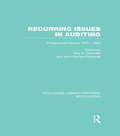- Table View
- List View
Recruitment and Selection: Strategies for Workforce Planning & Assessment
by Carrie A. PicardiThe workforce is changing and talent management is more important than ever. Recruitment and Selection: Strategies for Workforce Planning & Assessment unpacks best practices for designing, implementing, and evaluating strategies for hiring the right people. Using a proven job analysis framework, author Carrie A. Picardi uses her academic and industry experience to teach students how to assess candidates in an accurate, legal, and ethical manner. With clarity and relevance, this book truly bridges theory and concept with practice in an engaging manner and will benefit students who need to hit the ground running to successfully manage workforce needs and activities in a myriad professional settings.
Recruitment and Selection: Strategies for Workforce Planning & Assessment
by Carrie A. PicardiThe workforce is changing and talent management is more important than ever. Recruitment and Selection: Strategies for Workforce Planning & Assessment unpacks best practices for designing, implementing, and evaluating strategies for hiring the right people. Using a proven job analysis framework, author Carrie A. Picardi uses her academic and industry experience to teach students how to assess candidates in an accurate, legal, and ethical manner. With clarity and relevance, this book truly bridges theory and concept with practice in an engaging manner and will benefit students who need to hit the ground running to successfully manage workforce needs and activities in a myriad professional settings.
Recruitment of a Star
by Boris Groysberg Jennifer Haimson Steve BalogDetails power dynamics that unfold in the firm when one of its best and brightest threatens to leave. It focuses on the dynamics of attracting, hiring, compensating, negotiating, and leveraging a star performer in a professional service firm. In particular, traces the detailed events from the resignation of a star to the manager's struggle to decide which of the eligible candidates should be hired. Four candidates and their firms are discussed in great detail. The case allows students to consider both individual (e.g., background, aspirations, attitudes, past short-term and long-term performance) and organizational (e.g., cultures, strategies, structures, performance management systems) factors in choosing a candidate to maximize individual-organization fit.
Recrutainment: Gamification in Employer Branding, Personalmarketing und Personalauswahl
by Joachim Diercks Kristof Kupka Lars J. JansenRecrutainment hat sich in den letzten Jahren zu einem deutlich sichtbaren und allgemein akzeptierten Instrument in der Personalgewinnung entwickelt: Immer mehr Organisationen setzen auf spielerisch-simulative Elemente in Berufsorientierung, Employer Branding, Personalmarketing und Recruiting. Recrutainment ist die Gamification der Personalgewinnung.Self-Assessments, unterhaltsam und spielerisch-informativ gestaltete Online-Assessments, Berufsorientierungsspiele oder auch Offline-Recrutainment-Events verbessern nachweislich das stimmige Zusammenfinden von Kandidat und Arbeitgeber und versprechen so nicht nur eine optimale Stellenbesetzung, sondern stärken auch das Profil der Arbeitgebermarke.Diese zweite Auflage unter dem Titel Recrutainment ist kein Herausgeber-, sondern ein vollständig neu entwickeltes Autorenwerk. Die wissenschaftliche Basis von Recrutainment wird umfassend herausgearbeitet sowie die Ergebnisse empirischer Forschung vorgestellt. Zahlreiche Praxisbeispiele zeigen verschiedene Facetten von Recrutainment und die vielfältigen Einsatzmöglichkeiten in der Unternehmenspraxis. Das Buch richtet sich sowohl an HR-Praktikerinnen und -Praktiker als auch an Studierende, die die Grundlagen der psychologischen Personalauswahl und des Personalmarketings kennenlernen möchten. Der InhaltPersonalgewinnung, -marketing und -auswahlRecrutainment – die Gamification des RecruitingsOffline-Recrutainment – Vom Event vor Ort bis zum Blended-RecrutainmentSelf-Assessments – Online-Recrutainment in der SelbstauswahlOnline-Assessments – Online-Recrutainment in der Fremdauswahl
Recrutainment: Spielerische Ansätze in Personalmarketing und -auswahl
by Joachim Diercks and Kristof KupkaUm gute Mitarbeiter zu finden, reichen die üblichen Wege im Recruiting längst nicht mehr aus: Immer mehr Organisationen setzen auf Recrutainment, also den Einsatz spielerisch-simulativer Elemente in Berufsorientierung, Employer Branding, Personalmarketing und Recruiting.Self-Assessments, unterhaltsam und informativ gestaltete Online-Assessments, Berufsorientierungsspiele oder auch Offline-Recrutainment-Events verbessern nachweislich das stimmige Zusammenfinden von Kandidat und Arbeitgeber und versprechen so nicht nur eine optimale Stellenbesetzung, sondern stärken auch das Profil der Arbeitgebermarke. Das Buch liefert das theoretische Fundament für das Thema Recrutainment und erklärt, warum dessen Bedeutung in den letzten Jahren so stark zugenommen hat. Es werden die Auswirkungen von Recrutainment auf Organisationen und Bewerber unter Einbeziehung von aktuellen Studien beleuchtet. In ausgewählten Best Practice Beispielen stellen verschiedene Autoren dar, wie Recrutainment in der Unternehmenspraxis eingesetzt wird.
Recupera tu vida con una mente extendida: El método definitivo de efectividad personal
by José Miguel Bolivar Jordi FortunyUn método nuevo y disruptivo, un paso de gigante hacia la efectividad. Después de más de diez años ayudando a personas y organizaciones a ser más efectivas y lograr resultados, José Miguel Bolívar y Jordi Fortuny han creado OPTIMA3®, el método definitivo de efectividad personal. En este libro, los autores combinan todo su conocimiento y saber hacer con su experiencia como formadores certificados en GTD® de David Allen para diseñar una nueva metodología: un enfoque sencillo y flexible que elimina las complicaciones y se adapta a las necesidades y retos de los profesionales de hoy. Con OPTIMA3® aprenderás a: * vivir sin estrés y sin olvidos * recuperar la sensación de tener todos tus asuntos bajo control * priorizar qué hacer y qué no hacer en cada instante* aumentar tu productividad en un 40% Prepárate a descubrir una forma más sostenible de efectividad, basada en evidencias y centrada en el bienestar de las personas. Te cambiará la vida. Testimonios de lectores: «La explicación inicial de cómo trabajamos actualmente me resultó muy reveladora y me ayudó a no sentirme tan culpable de mi comportamiento a la hora de organizarme. Para mí, entender este punto ha sido clave para poder hacer borrón y cuenta nueva». «Poder llegar a vaciar la mente para ganar en efectividad, creatividad, tranquilidad y seguridad es extraordinario».«OPTIMA3® me ha permitido unificar todas mis listas anteriores y aprender un nuevo enfoque situacional, adaptando la lista a mí, no adaptándome yo a las listas». «Una herramienta capaz de aglutinar todas las actividades, tanto personales como laborales. En la parte laboral se agradece especialmente saber que es posible tener una bandeja de entrada limpia».«Este libro ayuda a entender por qué nos pasan las cosas y recordar la importancia de la efectividad, de la concentración, de la necesidad de poner foco, que a veces se nos olvida». «Me ha sido muy útil aprender a organizar todos los pensamientos "rumiantes" en listas. Completar listas es satisfactorio, pero nunca como hasta ahora me había permitido descargar por completo la mente».«Pensaba que aplicarlo en mi trabajo era imposible, pero me llevo una mente extendida y ganas de empezar a ponerlo en práctica desde ya». «Con el método OPTIMA3® ha cambiado mi percepción sobre cómo me organizaba hasta ahora, y espero sacar mayor partido de mi tiempo y mis decisiones a la hora de ejecutar actividades».
Recurring Issues in Auditing: Professional Debate 1875-1900 (Routledge Library Editions: Accounting)
by John Richard Edwards Roy A. ChandlerThis book gives a flavour of the issues that concerned auditing practitioners more than one hundred years ago and which retain a certain relevance to us today. The material is arranged chronologically and thereby emphasizes the interconnections between the issues as well as conveying the overall depth and flavour of the debate.
Recursive Methods in Economic Dynamics
by Robert E. Lucas Nancy L. StokeyThis rigorous but brilliantly lucid book presents a self-contained treatment of modern economic dynamics. Stokey, Lucas, and Prescott develop the basic methods of recursive analysis and illustrate the many areas where they can usefully be applied. After presenting an overview of the recursive approach, the authors develop economic applications for deterministic dynamic programming and the stability theory of first-order difference equations. They then treat stochastic dynamic programming and the convergence theory of discrete-time Markov processes, illustrating each with additional economic applications. They also derive a strong law of large numbers for Markov processes. Finally, they present the two fundamental theorems of welfare economics and show how to apply the methods developed earlier to general equilibrium systems. The authors go on to apply their methods to many areas of economics. Models of firm and industry investment, household consumption behavior, long-run growth, capital accumulation, job search, job matching, inventory behavior, asset pricing, and money demand are among those they use to show how predictions can he made about individual and social behavior. Researchers and graduate students in economic theory will find this book essential.
Recursive Models of Dynamic Linear Economies (The Gorman Lectures in Economics #6)
by Thomas J. Sargent Lars Peter HansenA guide to the economic modeling of household preferences, from two leaders in the fieldA common set of mathematical tools underlies dynamic optimization, dynamic estimation, and filtering. In Recursive Models of Dynamic Linear Economies, Lars Peter Hansen and Thomas Sargent use these tools to create a class of econometrically tractable models of prices and quantities. They present examples from microeconomics, macroeconomics, and asset pricing. The models are cast in terms of a representative consumer. While Hansen and Sargent demonstrate the analytical benefits acquired when an analysis with a representative consumer is possible, they also characterize the restrictiveness of assumptions under which a representative household justifies a purely aggregative analysis.Hansen and Sargent unite economic theory with a workable econometrics while going beyond and beneath demand and supply curves for dynamic economies. They construct and apply competitive equilibria for a class of linear-quadratic-Gaussian dynamic economies with complete markets. Their book, based on the 2012 Gorman lectures, stresses heterogeneity, aggregation, and how a common structure unites what superficially appear to be diverse applications. An appendix describes MATLAB programs that apply to the book's calculations.
Recycled Polyester: Manufacturing, Properties, Test Methods, and Identification (Textile Science and Clothing Technology)
by Subramanian Senthilkannan MuthuThis book provides an overview of recycled polyesters, which are an important sustainable raw material in textile production. It discusses the manufacturing methods and the unique properties of recycled polyesters manufactured using the different methods. It also highlights the various test methods and identification mechanisms for recycled polyesters, which are very essential for ensuring the traceability and conformity of usage of recycled polyester in the final product.
Recycling Land: Understanding the Legal Landscape of Brownfield Development
by Elizabeth Glass GeltmanOlder--and often economically depressed--industrial cities generally have a number of well located but abandoned industrial sites. Too frequently these sites are heavily polluted by the residue of toxic wastes dumped when old factories were still in use. These "brownfield" sites must be cleaned up under existing law before they can be redeveloped. And yet the question of who will bear the cost of this cleanup frequently stymies efforts to return these sites to productive use. A complicated net of federal, state and local regulations can involve several generations of owners in potential liability for the cleanup, frequently resulting only in extended litigation, not often in the cleanup of the site. In this book, Elizabeth Glass Geltman surveys the laws on both the federal and state level with regard to the cleanup of brownfield sites. The author makes valuable suggestions for reforming these laws that will help encourage land reuse and the accompanying redevelopment of the industrial base of many American cities both large and small. Elizabeth Glass Geltman is Professor of Law, George Washington University Law School and is the author of many books on environmental law, includingModern Environmental Law: Policy and Practice.
Recycling and Extended Producer Responsibility: The European Experience
by Rui Cunha Marques Nuno Ferreira CruzAn overriding value of European legislation on waste management is the Extended Producer Responsibility (EPR) principle. For example, all economic operators placing packaging onto the EU market are responsible for its proper management and recovery. However, in general, the collection and treatment of urban waste is the responsibility of local authorities. It has therefore been necessary to establish a system of financial compensations between producers and waste management operators. Analysing the legal and institutional schemes of several member states and accounting for all the costs and benefits to their local authorities due to selective collection and sorting, this book provides an accurate illustration of how the EPR principle has be translated into practice. Firstly the authors examine whether the industry is paying for the net financial cost of 'preparation for recycling' activities or if the extra-costs of recycling are being recovered via the sale of sorted materials, by the consumer through higher prices or by citizens in general through higher taxes. Secondly, by monetizing the net environmental benefits attained with the recycling system, the book discusses the success and Value-for-Money (VfM) of the EU’s recycling policy. In other words: what is the economic rate of return of the enhanced environmental protection achieved due to the fulfilment of recovery and recycling targets?
Recycling and Incineration: Evaluating The Choices
by John Ruston Richard Denison Environmental Defense FundRecycling and Incineration presents information on the technology, economics, environmental concerns, and legal intricacies behind recycling and incineration programs.
Recycling, a Challenge for the Circular Economy (ISTE Consignment)
by Michel CathelineauReducing consumption is now an absolute necessity for the future of our environment. The circular economy is designed to reduce resource wastage and waste production, but also enables waste recovery, leading to the creation of secondary resources. All materials, regardless of how they have been processed, can be reused. Recycling, a Challenge for the Circular Economy begins its analysis by raising awareness of the role of each of us in reducing the volume of individual waste. The book then outlines the strategies and challenges involved in recycling a wide range of materials, from minimally processed (wood, glass, building materials or polluted soil) to highly processed (electrical and electronic waste, batteries, magnets or plastics). Aspects of resource availability are also discussed, as well as ways of addressing the dynamic cycle of materials in the context of ever-increasing demand.
Red Alert: How China's Growing Prosperity Threatens the American Way of Life
by Stephen Leeb Gregory Dorsey"I would caution readers to dismiss Stephen Leeb's warnings only at their peril." -Thomas Kaplan, chairman, Tigris Financial Group The American Dream is close to being replaced by a living nightmare: Key commodities that are essential to our daily lives and that are widely believed to be abundant are running critically short. Even worse, the Chinese are doing what they can to monopolize the world's dwindling resources.The U.S. is now largely dependent on our greatest economic rival for rare earth elements as well as a host of other minerals-all of which are absolutely essential to the development of alternative energies and are critically important for our defense industry, computers, cell phones, and other electronic devices. While America has been fighting wars in Iraq and Afghanistan, China has focused its substantial muscle on securing vital commodities from these and other lands to upgrade its infrastructure and industrial strength to meet the resource challenge head-on.China has wrapped itself in the green flag of combating climate change while systematically discouraging other nations from adopting similar policies in a bid to gain time to achieve its plans. RED ALERT is a provocative and frightening look at the growing political, economic, and social power of China and the threat that nation poses to the Western world. It lays out how the Chinese are strategizing to overtake the United States as the world's premier economic power-and details how our failure to respond quickly will result in a permanently lower standard of living for Americans. Peppered with startling statistics, charts, and evidence of how China continues to expand its economic reach, RED ALERT is both controversial and powerful in its scope.
Red Bull
by Carin-Isabel Knoop Eric J. Van Den SteenDespite facing giants like Coke, Pepsi, and Budweiser-with obvious potential sources of competitive advantage-Red Bull had established itself as the U.S. market leader in energy drinks. By 2008, however, Red Bull's dominance was challenged as Monster drinks surpassed it in volume. The case considers judo strategy both from the perspective of a small player (when up-start Red Bull faces Coke, Pepsi, and Bud) and as a large player (when market leader Red Bull faces up-start Monster).
Red Bull (A)
by Carin-Isabel Knoop Eric Van Den SteenDespite facing giants like Coke, Pepsi, and Budweiser-with obvious potential sources of competitive advantage-Red Bull had established itself as the U.S. market leader in energy drinks. By 2008, however, Red Bull's dominance was challenged as Monster drinks surpassed it in volume. The case considers judo strategy both from the perspective of a small player (when up-start Red Bull faces Coke, Pepsi, and Bud) and as a large player (when market leader Red Bull faces up-start Monster).
Red Capitalism: The Fragile Financial Foundation of China's Extraordinary Rise
by Carl Walter Fraser HowieThe truth behind the rise of China and whether or not it will be able to maintain it How did China transform itself so quickly? In Red Capitalism: The Fragile Financial Foundation of China's Extraordinary Rise, Revised Edition Carl Walter and Fraser Howie go deep inside the Chinese financial machine to illuminate the social and political consequences of the unique business model that propelled China to economic powerhouse status, and question whether this rapid ascension really lives up to its reputation. All eyes are on China, but will it really surpass the U.S. as the world's premier global economy? Walter and Howie aren't so certain, and in this revised and updated edition of Red Capitalism they examine whether or not the 21st century really will belong to China. The specter of a powerful China is haunting the U.S. and other countries suffering from economic decline and this book explores China's next move Packed with new statistics and stories based on recent developments, this new edition updates the outlook on China's future with the most cutting-edge information available Find out how China financed its current position of strength and whether it will be able to maintain its astonishing momentum Indispensable reading for anyone looking to understand the limits that China's past development decisions have imposed on its brilliant future, Red Capitalism is an essential resource for anyone considering China's business strategies in today's extremely challenging global economy.
Red Carpet: Hollywood, China, and the Global Battle for Cultural Supremacy
by Erich Schwartzel"This is a fascinating book. It will educate you. Schwartzel has done some extraordinary reporting." — The New York Times Book Review &“In this highly entertaining but deeply disturbing book, Erich Schwartzel demonstrates the extent of our cultural thrall to China. His depiction of the craven characters, American and Chinese, who have enabled this situation represents a significant feat of investigative journalism. His narrative is about not merely the movie business, but the new world order.&” —Andrew Solomon, author of Far from the Tree and The Noonday DemonAn eye-opening and deeply reported narrative that details the surprising role of the movie business in the high-stakes contest between the U.S. and ChinaFrom trade to technology to military might, competition between the United States and China dominates the foreign policy landscape. But this battle for global influence is also playing out in a strange and unexpected arena: the movies. The film industry, Wall Street Journal reporter Erich Schwartzel explains, is the latest battleground in the tense and complex rivalry between these two world powers. In recent decades, as China has grown into a giant of the international economy, it has become a crucial source of revenue for the American film industry. Hollywood studios are now bending over backward to make movies that will appeal to China&’s citizens—and gain approval from severe Communist Party censors. At the same time, and with America&’s unwitting help, China has built its own film industry into an essential arm of its plan to export its national agenda to the rest of the world. The competition between these two movie businesses is a Cold War for this century, a clash that determines whether democratic or authoritarian values will be broadcast most powerfully around the world. Red Carpet is packed with memorable characters who have—knowingly or otherwise—played key roles in this tangled industry web: not only A-list stars like Matt Damon, Angelina Jolie, and Richard Gere but also eccentric Chinese billionaires, zany expatriate filmmakers, and starlets who disappear from public life without explanation or trace. Schwartzel combines original reporting, political history, and show-biz intrigue in an exhilarating tour of global entertainment, from propaganda film sets in Beijing to the boardrooms of Hollywood studios to the living rooms in Kenya where families decide whether to watch an American or Chinese movie. Alarming, occasionally absurd, and wildly entertaining, Red Carpet will not only alter the way we watch movies but also offer essential new perspective on the power struggle of this century.
Red Flags: Why Xi's China Is in Jeopardy
by George MagnusA trusted economic commentator provides a penetrating account of the threats to China's continued economic rise Under President Xi Jinping, China has become a large and confident power both at home and abroad, but the country also faces serious challenges. In this critical take on China’s future, economist George Magnus explores four key traps that China must confront and overcome in order to thrive: debt, middle income, the Renminbi, and an aging population. Looking at the political direction President Xi Jinping is taking, Magnus argues that Xi’s authoritarian and repressive philosophy is ultimately not compatible with the country’s economic aspirations. Thorough and well researched, the book also investigates the potential for conflicts over trade, China’s evolving relationship with Trump, and the country’s attempt to win influence and control in Eurasia through the Belt and Road initiative.
Red Gas: Russia and the Origins of European Energy Dependence (Palgrave Macmillan Transnational History Series)
by Per HögseliusThis book applies a systems and risk perspective on international energy relations, author Per Högselius investigates how and why governments, businesses, engineers and other actors sought to promote – and oppose– the establishment of an extensive East-West natural gas regime that seemed to overthrow the fundamental logic of the Cold War.
Red Globalization
by Oscar Sanchez-SibonyWas the Soviet Union a superpower? Red Globalization is a significant rereading of the Cold War as an economic struggle shaped by the global economy. Oscar Sanchez-Sibony challenges the idea that the Soviet Union represented a parallel socio-economic construct to the liberal world economy. Instead he shows that the USSR, a middle-income country more often than not at the mercy of global economic forces, tracked the same path as other countries in the world, moving from 1930s autarky to the globalizing processes of the postwar period. In examining the constraints and opportunities afforded the Soviets in their engagement of the capitalist world, he questions the very foundations of the Cold War narrative as a contest between superpowers in a bipolar world. Far from an economic force in the world, the Soviets managed only to become dependent providers of energy to the rich world, and second-best partners to the global South.
Red Gold: The Managed Extinction of the Giant Bluefin Tuna
by Jennifer E. TelescaIlluminating the conditions for global governance to have precipitated the devastating decline of one of the ocean&’s most majestic creatures The International Commission for the Conservation of Atlantic Tunas (ICCAT) is the world&’s foremost organization for managing and conserving tunas, seabirds, turtles, and sharks traversing international waters. Founded by treaty in 1969, ICCAT stewards what has become under its tenure one of the planet&’s most prominent endangered fish: the Atlantic bluefin tuna. Called &“red gold&” by industry insiders for the exorbitant price her ruby-colored flesh commands in the sushi economy, the giant bluefin tuna has crashed in size and number under ICCAT&’s custodianship.With regulations to conserve these sea creatures in place for half a century, why have so many big bluefin tuna vanished from the Atlantic? In Red Gold, Jennifer E. Telesca offers unparalleled access to ICCAT to show that the institution has faithfully executed the task assigned it by international law: to fish as hard as possible to grow national economies. ICCAT manages the bluefin not to protect them but to secure export markets for commodity empires—and, as a result, has become complicit in their extermination.The decades of regulating fish as commodities have had disastrous consequences. Amid the mass extinction of all kinds of life today, Red Gold reacquaints the reader with the splendors of the giant bluefin tuna through vignettes that defy technoscientific and market rationales. Ultimately, this book shows, changing the way people value marine life must come not only from reforming ICCAT but from transforming the dominant culture that consents to this slaughter.
Red Hat and the Linux Revolution
by Alan Maccormack Kerry HermanThe case describes the history of the Linux operating system and the open-source movement in general. Focuses on a critical decision being made by Red Hat, the largest distributor of Linux, about its future development efforts. The decision allows students to explore alternative approaches to software development and examine the dramatic success of the open-source method.
Red Hen Baking Company
by Richard S. Ruback Royce YudkoffIn 2007, the Red Hen Baking Company was deciding whether to move from its cramped and inefficient facility to a new facility. It had been in business about 8 years, and 2006 was the first year RHB realized a profit that was over $50,000. The added annual cost of the new location was about $58,000 and would require a $300,000 build-out. While the owner of Red Hen was excited about the possibility of a new, efficient bakery, he wondered if it was worth the added expense and risk.

















